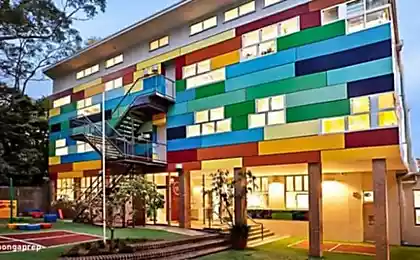745
What to do if the child does not want to go to school
Usually wonder, "why not?"
I would ask a different question: "why does he actually should want to go?"
And another question: "And you, parents, always want to work?"
When raising children, I always draw an analogy with adult life. It's even easier than trying to put yourself in the place of the child. Good and clarifies the situation.
Yeah, I don't always want to work. But it is necessary. Moreover, it is necessary not a spherical horse in vacuum, and to me the most. Work brings me money, money provide satisfaction. That is, I have financial motivation to work.
And it so happens that the work — like that soul is singing and I want to create. For example, when I receive praise and recognition. This intangible motivation.

And it so happens that the project initially does not bring neither profit nor recognition... But there is a belief that after a certain period of time, all the efforts and investments will pay off. And then there will be money and recognition. This is the motivation for the future.
What is the motivation for learning of your child?
1. Help him to understand the value of education, to understand what he learns and how he or she will need in later life. Not only in the form of a tedious monologue about the abstract prospects of admission to the UNIVERSITY ("Damn, even to study there...") and a prestigious job ("And again will not rest")...
Ask what the child wants. And then show how the study will help to achieve the desired. It is important to understand that not all information obtained in the process of learning will ever be useful in life. The value of education is not to get a certain amount of knowledge, and to develop the skill of information processing, memory, speech, logical thinking, the ability to establish causal relationships. I love the words of Lomonosov, "Mathematics should be taught only then that she mind in order leads"
I would have generalized this to all education. Any education — mind in order. Theorem proving facilitates the development of the ability to rationalize their point of view, convincing the opponent. The use of formulas, helps build the analogy and adapt someone else's successful experience under their actual tasks.
Solution of problems about the pipes in the pool, in which water flows in and flows out to prepare the brain to solve other life problems. About the family budget or the profitability of the business — there is also the money flow in and out... Similarly with any school subject or another, and useful...
2. Child create a situation of success. Emotions of success are so strong that I want to relive them again and again. Success inspires, motivates, want to continue to strive and achieve. Praise the child even for small achievements. Do not compare with other children.
You can only compare with the previous results of the child. If the child has low grades in all subjects, focus on one first. Increased attention may work with a tutor, will lead to higher achievement on the subject and confidence in their abilities. And then you can take up the next item.
3. Come up with a reward system. It's okay if the child for doing well in school gets a welcome gift. He tried. He earned. Not normal, if it becomes the only motivation.
However a strong motivation to work, sometimes conflicts in the workplace lead people to layoffs. The child has no possibility to resign from the school... But you can start to skip...
It is important to understand that the leading activity of a teenager is communication. And often a negative to the school is due to problems in communicating with classmates. In this case, you need to solve the problem is not with motivation, and communication skills and building relationships. There may be needed a psychologist to understand what features of the communication style of the child led to the current situation.
Without this clarification and appropriate correction of behavior, even transferring to another school will not solve the problem, because the probability of recurrence of the situation. In contrast, when a cohesive classroom team to the school the child goes with pleasure, because pleasure to meet friends. Team building class through joint leisure activities (Hiking, trips, excursions) is an important task not so much of a teacher, how many parents.
How to educate in the family of the leader: 4 simple rules
Naughty children: what to do?
Parents should initiate activities and active participants. Children are easier to be friends when friends of their parents. Joint activities of parents with children in the primary grades – the relative calm of parents in high. Parent easier to understand the situation in the class your child when he knows all the classmates and their parents. Understanding of the situation is an opportunity to influence it and to help the child.published
Author: Anna Bykova
Source: annabykova.ru/shkolnyj-vozrast/esli-rebenok-ne-xochet-idti-v-shkolu.html
I would ask a different question: "why does he actually should want to go?"
And another question: "And you, parents, always want to work?"
When raising children, I always draw an analogy with adult life. It's even easier than trying to put yourself in the place of the child. Good and clarifies the situation.
Yeah, I don't always want to work. But it is necessary. Moreover, it is necessary not a spherical horse in vacuum, and to me the most. Work brings me money, money provide satisfaction. That is, I have financial motivation to work.
And it so happens that the work — like that soul is singing and I want to create. For example, when I receive praise and recognition. This intangible motivation.

And it so happens that the project initially does not bring neither profit nor recognition... But there is a belief that after a certain period of time, all the efforts and investments will pay off. And then there will be money and recognition. This is the motivation for the future.
What is the motivation for learning of your child?
1. Help him to understand the value of education, to understand what he learns and how he or she will need in later life. Not only in the form of a tedious monologue about the abstract prospects of admission to the UNIVERSITY ("Damn, even to study there...") and a prestigious job ("And again will not rest")...
Ask what the child wants. And then show how the study will help to achieve the desired. It is important to understand that not all information obtained in the process of learning will ever be useful in life. The value of education is not to get a certain amount of knowledge, and to develop the skill of information processing, memory, speech, logical thinking, the ability to establish causal relationships. I love the words of Lomonosov, "Mathematics should be taught only then that she mind in order leads"
I would have generalized this to all education. Any education — mind in order. Theorem proving facilitates the development of the ability to rationalize their point of view, convincing the opponent. The use of formulas, helps build the analogy and adapt someone else's successful experience under their actual tasks.
Solution of problems about the pipes in the pool, in which water flows in and flows out to prepare the brain to solve other life problems. About the family budget or the profitability of the business — there is also the money flow in and out... Similarly with any school subject or another, and useful...
2. Child create a situation of success. Emotions of success are so strong that I want to relive them again and again. Success inspires, motivates, want to continue to strive and achieve. Praise the child even for small achievements. Do not compare with other children.
You can only compare with the previous results of the child. If the child has low grades in all subjects, focus on one first. Increased attention may work with a tutor, will lead to higher achievement on the subject and confidence in their abilities. And then you can take up the next item.
3. Come up with a reward system. It's okay if the child for doing well in school gets a welcome gift. He tried. He earned. Not normal, if it becomes the only motivation.
However a strong motivation to work, sometimes conflicts in the workplace lead people to layoffs. The child has no possibility to resign from the school... But you can start to skip...
It is important to understand that the leading activity of a teenager is communication. And often a negative to the school is due to problems in communicating with classmates. In this case, you need to solve the problem is not with motivation, and communication skills and building relationships. There may be needed a psychologist to understand what features of the communication style of the child led to the current situation.
Without this clarification and appropriate correction of behavior, even transferring to another school will not solve the problem, because the probability of recurrence of the situation. In contrast, when a cohesive classroom team to the school the child goes with pleasure, because pleasure to meet friends. Team building class through joint leisure activities (Hiking, trips, excursions) is an important task not so much of a teacher, how many parents.
How to educate in the family of the leader: 4 simple rules
Naughty children: what to do?
Parents should initiate activities and active participants. Children are easier to be friends when friends of their parents. Joint activities of parents with children in the primary grades – the relative calm of parents in high. Parent easier to understand the situation in the class your child when he knows all the classmates and their parents. Understanding of the situation is an opportunity to influence it and to help the child.published
Author: Anna Bykova
Source: annabykova.ru/shkolnyj-vozrast/esli-rebenok-ne-xochet-idti-v-shkolu.html
























